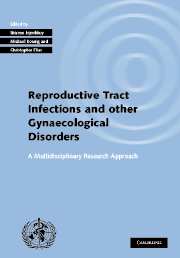 Investigating Reproductive Tract Infections and Other Gynaecological Disorders
Investigating Reproductive Tract Infections and Other Gynaecological Disorders Book contents
- Frontmatter
- Contents
- List of contributors
- Foreword by Paul F.A. Van Look
- Acknowledgements
- 1 Introduction and overview
- 2 Defining reproductive tract infections and other gynaecological morbidities
- 3 The social context of gynaecological morbidity: correlates, consequences and health seeking behaviour
- 4 Reproductive health: men's roles and men's rights
- 5 Study design for the measurement of gynaecological morbidity
- 6 Alternatives to community-based study designs for research on women's gynaecological morbidity
- 7 Community interaction in studies of gynaecological morbidity: experiences in Egypt, India and Uganda
- 8 Definitions of clinically diagnosed gynaecological morbidity resulting from reproductive tract infection
- 9 Laboratory tests for the detection of reproductive tract infections
- 10 Laboratory methods for the diagnosis of reproductive tract infections and selected conditions in population-based studies
- 11 The value of the imperfect: the contribution of interview surveys to the study of gynaecological ill health
- 12 Qualitative methods in gynaecological morbidity research
- 13 Integrating qualitative and quantitative methods in research on reproductive health
- 14 Interpreting results from different sources of data
- 15 Turning research into action
- Appendix A Notes on contributors
- Index
13 - Integrating qualitative and quantitative methods in research on reproductive health
Published online by Cambridge University Press: 07 December 2009
- Frontmatter
- Contents
- List of contributors
- Foreword by Paul F.A. Van Look
- Acknowledgements
- 1 Introduction and overview
- 2 Defining reproductive tract infections and other gynaecological morbidities
- 3 The social context of gynaecological morbidity: correlates, consequences and health seeking behaviour
- 4 Reproductive health: men's roles and men's rights
- 5 Study design for the measurement of gynaecological morbidity
- 6 Alternatives to community-based study designs for research on women's gynaecological morbidity
- 7 Community interaction in studies of gynaecological morbidity: experiences in Egypt, India and Uganda
- 8 Definitions of clinically diagnosed gynaecological morbidity resulting from reproductive tract infection
- 9 Laboratory tests for the detection of reproductive tract infections
- 10 Laboratory methods for the diagnosis of reproductive tract infections and selected conditions in population-based studies
- 11 The value of the imperfect: the contribution of interview surveys to the study of gynaecological ill health
- 12 Qualitative methods in gynaecological morbidity research
- 13 Integrating qualitative and quantitative methods in research on reproductive health
- 14 Interpreting results from different sources of data
- 15 Turning research into action
- Appendix A Notes on contributors
- Index
Summary
The purpose of this chapter is to examine the ways in which qualitative and quantitative methods have been used together in reproductive health research. Before discussing the ways in which the two research approaches have been combined, a brief summary of the relative strengths and weaknesses of the two methods is presented. After reviewing the various approaches to integrating qualitative and quantitative data, we will present some of the ways in which the triangulation of different types of data can be effectively presented and interpreted.
In earlier decades, social scientists and other health care researchers tended to divide into competing methodological-cum-theoretical camps, creating an antithesis between quantitative versus qualitative paradigms for research. Some qualitative researchers took a basically anti-science position, and argued that the use of statistics and measurement in human behaviour was misconceived and misleading. Philosophical ideas associated with phenomenology, hermeneutics and ‘postmodernism’ argued for ‘other ways of knowing’ that needed no numerical treatment or other standardized presentation of empirical data. On the other side of the argument, a few quantitatively oriented researchers have appeared to equate the concept of ‘science’ with numerical analysis of data, particularly when associated with the ‘experimental method’. For example, in describing evaluation research, Rossi and Wright (1977:13) have claimed that ‘there is almost universal agreement among evaluation researchers that the randomized controlled experiment is the ideal model for evaluating the effectiveness of public policy’.
- Type
- Chapter
- Information
- Investigating Reproductive Tract Infections and Other Gynaecological DisordersA Multidisciplinary Research Approach, pp. 360 - 390Publisher: Cambridge University PressPrint publication year: 2003


